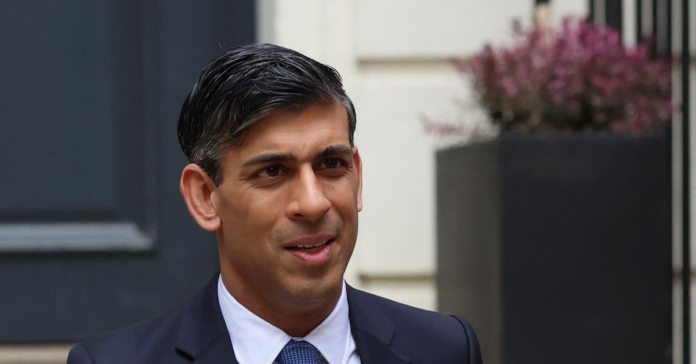LONDON, June 21 (Reuters Breakingviews) – UK Prime Minister Rishi Sunak is under pressure to provide relief for mortgage borrowers buckling under soaring interest rates. Stubbornly high inflation, tight public finances and jittery investors will force him to tread carefully. The risk is that he does too little to solve the home loans emergency – and his own government’s popularity crisis.
Rising prices and borrowing costs have left Britain’s 1.7 trillion pound mortgage market in a bind. Rates on the average five-year fixed-rate housing loan are around 5.67%. That’s the highest level since they topped 6% after the infamous “mini-budget” that led to the departure of Sunak’s predecessor Liz Truss. Some 800,000 borrowers still need to refinance their loans this year, followed by a further 1.6 million homeowners next year, according to UK Finance. The Resolution Foundation estimates the average homeowner who renegotiates their mortgage in 2024 will have to pay an extra 2,900 pounds a year.
With an election due by January 2025 – and polls showing his Conservatives trailing the opposition Labour Party by 16 percentage points – Sunak cannot afford to do nothing. But neither can he afford to offer state aid to homeowners. That’s because the public finances are stretched and investors are monitoring Britain’s debt levels following the disastrous “Trussonomics” experiment.
The government may therefore lean on banks instead. Finance minister Jeremy Hunt said on Tuesday he would talk to lenders. Official pressure could persuade banks to offer payment holidays for the less wealthy, as banks have done in Spain, or allow borrowers to fix rates at low levels for part of the loan, as in Poland. That would crimp banks’ profit margins but could prevent a wave of forced selling or repossessions.
The problem is that mortgage relief dilutes the Bank of England’s fight against inflation, which remained stubbornly high at 8.7% in May. Higher borrowing costs are the central bank’s main tool for crimping demand. Government interference in mortgage lending could force the BoE to even more aggressively raise rates, already at the highest level since 2008.
Not everyone is affected by the squeeze. The share of UK households with a mortgage has fallen below 30%, from nearly 40% in 1989, because more older people own their homes outright while younger people rent. Yet the ruling Conservative Party has spent years promoting home ownership. Sunak’s chances of remaining at his current address after the election hinge on his ability to ensure that millions of Britons can stay at theirs.
Reuters Graphics
Follow @guerreraf72 on Twitter
(The author is a Reuters Breakingviews columnist. The opinions expressed are his own)
CONTEXT NEWS
UK inflation rose by 8.7% year-on-year in May, official data showed on June 21, showing no change from April’s rate, but above expectations for an increase of 8.4%.
The core rate, which excludes food, energy, alcohol and tobacco, rose by 7.1% year-on-year, from 6.8% in April, keeping the Bank of England under pressure to deliver a big rate rise when it meets on June 22.
The UK government is to meet mortgage lenders to discuss helping households struggling with their home loans, finance minister Jeremy Hunt told parliament on June 20.
However, Hunt ruled out introducing state-backed support to help mortgage borrowers facing higher costs due to soaring interest rates. Hunt said that offering government mortgage relief would be inflationary.
Editing by George Hay and Oliver Taslic
Our Standards: The Thomson Reuters Trust Principles.
Opinions expressed are those of the author. They do not reflect the views of Reuters News, which, under the Trust Principles, is committed to integrity, independence, and freedom from bias.




